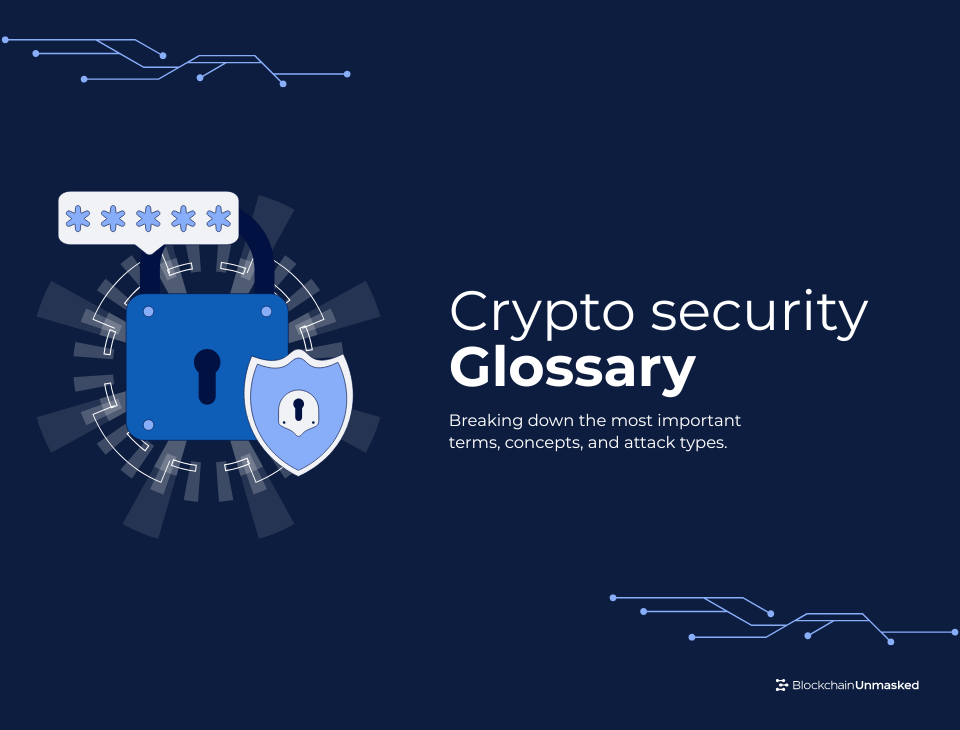Common red flags for spotting crypto scams
- Rachel Golden
- Nov 11, 2025
- 4 min read
Many scams, no matter how convincing, follow recognizable traits. Learning to spot those early can protect your funds, your data, and your reputation.

The crypto world moves fast, and so do the people trying to exploit it. From romance scams and fake airdrops to sophisticated phishing and investment schemes, crypto scams have evolved into an entire shadow economy. But whether they’re elaborate or low-effort, most scams share the same warning signs.
At BlockchainUnmasked, we analyze patterns of fraud and exploitation across the blockchain ecosystem. Over time, we’ve seen that many scams, no matter how convincing, follow recognizable traits. Learning to spot those early can protect your funds, your data, and your reputation.
Promises of guaranteed or outsized returns
If someone claims you’re “guaranteed” to double your money or earn “risk-free” yield, it’s almost certainly a scam. Legitimate investments carry risk. Scammers rely on greed and urgency, making false promises that sound too good to be true and a tight deadline associated with it.
Red flag: “Guaranteed” profits, “secret” strategies, or “limited-time” deals that pressure you to act quickly.
Requests to move communication off-platform
A classic move: a scammer initiates contact on one channel (social media, Discord, etc) and quickly asks you to move to Telegram, WhatsApp, or email. This limits traceability and makes it harder for the original platform to intervene.
Red flag: Anyone who resists staying on an official or verifiable channel.
Unverified or cloned project websites
Fake or cloned versions of legitimate projects can look nearly identical to the real thing. Logos, token tickers, even “verified” badges can be copied. Bad actors will also create fake profiles or impersonate social media accounts for executives from legitimate projects. Always double-check links, official announcements, and contract addresses. If someone asks you to send crypto “to verify” or “unlock rewards” it’s a scam.
Red flag: Slightly misspelled URLs, unofficial token links, or pages that prompt you to connect your wallet without context.
Pressure to connect your wallet or share keys
No legitimate platform, exchange, or recovery service will ever ask for your private key or seed phrase. Scammers use fake support chats, airdrop claims, or token migrations to trick users into signing malicious transactions.
Red flag: Any request for your private keys, seed phrase, or permissions for “unlimited spend”.
Emotional manipulation and social engineering
Not all scams are technical. Some exploit emotion. Romance scams, fake job offers, and charity drives are designed to build trust before striking. Scammers may post as recruiters, investors, or event support agents to exploit empathy and urgency.
Red flag: Anyone appealing to your sympathy, trust, or loyalty to justify transferring crypto.
Poor documentation or anonymous teams
Transparency is a cornerstone of legitimate blockchain projects. If founders are anonymous, whitepapers are vague, or the tokenomics seem copied from elsewhere, proceed with caution. Do a reverse imagine search on team photos and check smart contract audits before investing.
Red flag: No verifiable team profiles, unclear project goals, or inconsistent onchain activity.
Overcomplicated investment structures
Many scams rely on confusing or opaque mechanics. They often hide behind jargon like “AI trading bots,” “liquidity automation,” or “quant arbitrage systems.” When the explanation of how profits are made is vague or hard to verify, that’s intentional.
Red flag: When you can’t easily explain to someone else how the investment actually works.
Suspicious community behavior
Authentic crypto communities have healthy discussions, feedback, and even criticism. Scam communities suppress questions, ban skeptics, and flood channels with hype or fake testimonials.
Red flag: A Telegram or Discord full of repetitive praise, no meaningful discussion, and moderators who silence dissent.
Wallet approval airdrops
Scammers often airdrop unsolicited tokens or promote “exclusive” giveaways that prompt users to connect their wallets and approve a smart contract. These approvals can quietly grant the scammer control over your assets, allowing them to drain funds later.
Red flag: Any airdrop or token that asks you to approve a smart contract before claiming.
Imitation pop-ups
Fake pop-ups mimicking trusted wallet interfaces, like MetaMask or Phantom, can appear when visiting malicious sites or after clicking deceptive links. These pop-ups request seed phrases or full access permissions, giving attackers direct entry into your wallet.
Red flag: Pop-ups asking for seed phrases or full permissions
Random small token transfers
Dusting attacks or random token transfers may seem harmless, but they often serve as bait. Attackers track whether victims interact with the tokens or follow embedded links to phishing sites designed to capture wallet data.
Red flag: A small amount of tokens transferred into your account by an unknown sender.
Staying ahead of scams
If you suspect that you’re interacting with a scam or bad actor, stop engaging immediately.
Document everything: how they contacted you, what they said, anything and everything. Once documented, report that to the relevant authorities or scam database. And alert your own community to the dangers. You never know who could use the extra flag and what could save them.
Crypto innovation brings new opportunities and innovation. But it also brings new risk. Understanding how scams evolve and what early warning signs to look for can make the difference between safety and loss.
Be skeptical. Do your own research. Double check everything.
At BlockchainUnmasked, we track and document these patterns to make blockchain activity more transparent and accountable. By learning how scams work and sharing that knowledge openly, we can help build a safer, more trustworthy ecosystem for everyone.
Stay alert. Verify before you trust. Help build a safer ecosystem.


